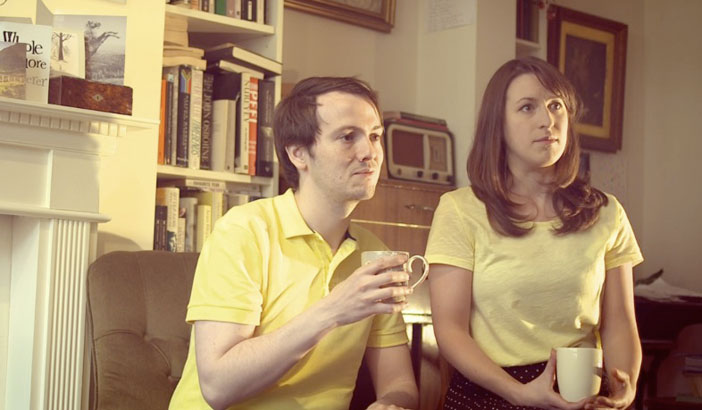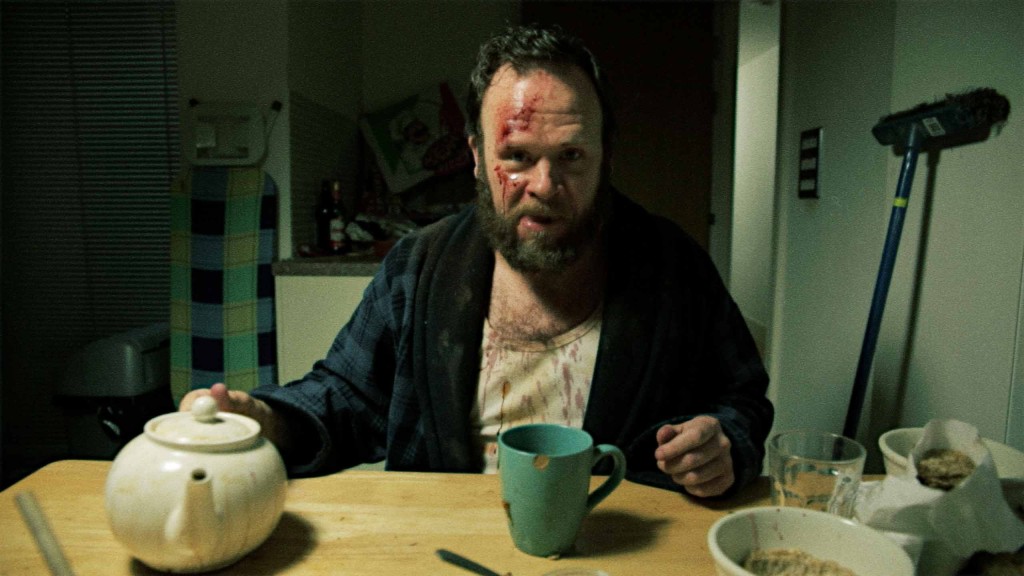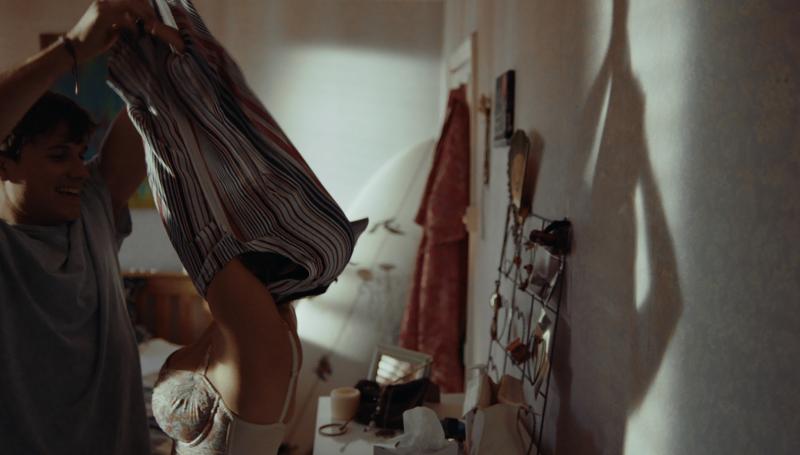Guest writer Thomas Humphrey takes a look at a recent wave of British shorts that have managed to combine the dark and gruesome with the absurd and hilarious, causing audiences to laugh in all the wrong places.
There’s lots of wonderful things about short films, and that includes their ability to do daring things with an intensity which features can rarely sustain. A good example of this would be the wave of British shorts in recent years that have been morbidly managing to make audiences laugh when they probably should have been be crying. This counter-intuitive and challenging aesthetic has seen a collection of UK films defile and shock so boldly that they have well and truly put “British humour” firmly back on the map.
Perhaps the most archetypal example of this was Stuart Laws’ Chubby Bunny (pictured above) in 2012. This simply shot short follows a youth club tournament where competitors have to insert as many marshmallows as they could into their mouth and still intelligibly say “chubby bunny.” Except, tragedy soon follows, and with great skill Laws somehow manages to intertwine child fatality with genuine comedy. In the hands of the socially-inept youth club leaders Jane and John (played by Laws himself), even scenes of weeping parental grief become a gloriously oxymoronic backdrop for everything from amusingly irrelevant avian terminology to anal sex jokes. And it is this tension between how we should feel and our desire to laugh anyway which makes Chubby Bunny such a delight.
Another film with a similar formula is Tom George’s Mickey and Michaela Bury Their Dad (2013). This short, as the title suggests, recounts a father’s internment – except this time the title’s two siblings had actually snuffed their old man. This film, with all its beautiful rural shots and off-kilter whistling, draws great character acting from its protagonists, and with great skill George patiently constructs one final surprise punchline. So by using his comic tools so cleverly, George somehow turns guilt, death and domestic strife into a fertile soil for dark comedy as well.
Two different, but still morbid takes on this uncomfortable strain of British comedy are Dogging (dir. Matthew Reed, 2014) and Milk! (dir. Ben Mallaby, 2015). The former is a tightly-knit narrative (almost all set in a car) which documents the brilliantly-named Keith and Val’s first attempt to go dogging. Full to the roof rack with marital quibbles and Anglo-Saxon sexual awkwardness, this movie still uses mortality as a punch-line, but its sable digital images also have you cringing for very different reasons.
And the same is true of Milk! (pictured above), a short which can only be described as a cross between Withnail and I and Itchy and Scratchy. Mallaby’s film is full of cartoonish humour and grotesque scenes which soon have you inappropriately guffawing, and it is certainly not for the faint hearted. Somehow this director makes you laugh as his two leads, Raymond and Timothy, suffer horrific attrition due to not having milk for their tea. Painfully British and gory, this short surprisingly makes you chuckle in the face of your own disgust, and that is no mean feat.
For the best specimens of this blossoming British dark comedy, we should look to the recent offerings of Jonathan van Tulleken and Dan Hodgson. In 2014, Tulleken came baring gifts with his BFI-funded Anthony, a short which centers on one of Santa’s eponymous and long-suffering elves. Written by and starring influential alternative comedian Tim Key, Anthony clearly bears the marks of his fascination with how comedy can be more of a narrative form. Plus, it is also one of the most wonderfully iconoclastic things ever, so we are lured into laughing at our own precious Christmas mythologies being excellently and systematically murdered. I mean, Santa even slays and eats Rudolf, for goodness sake!
This iconoclasm is very different to Dan Hodgson’s style, but his comedic technique has also proved so successful that his latest, Love is Blind (2015 - pictured above), was recently selected for the 68th Cannes Film Festival. Ever since 2013, this director’s dubstep-filled, punchy Are You Albert? made clear that he was a filmmaker interested in generating comedy out of dramatic irony and subverting our expectations. Well his Cannes entry certainly did that, as the title’s initial premise is undercut when the short turns out to feature a deaf protagonist. Hodgson then hilariously sets about exploring how brazenly one could conduct an affair in such a scenario. The results are certainly unmistakably funny and politically incorrect in equal measure, but that niggling sense that we shouldn’t be laughing never stops being exhilarating as the director introduces twist after twist.
This film’s inclusion in Cannes’ official short film category also shows how this boundary-pushing, genre-bending style of British films really has the potential to reach and entertain audiences right round the globe. So what remains important now is for these comedies to keep receiving the funding they require from the UK’s funding bodies, and care must also be taken to ensure that these dark tales of black humour continue to be told in surprising, fresh ways without becoming formulaic.
Written by guest writer Thomas Humphrey.




